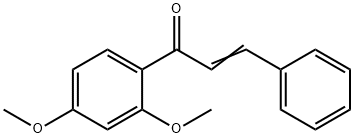| | 1154-77-4 Basic information More.. |
| Product Name: | 2',4'-dimethoxychalcone | | Synonyms: | 1-(2,4-Dimethoxyphenyl)-3-phenyl-2-propen-1-one;2-Propen-1-one, 1-(2,4-dimethoxyphenyl)-3-phenyl-;Chalcone, 2',4'-dimethoxy-;Einecs 214-577-3;(2E)-1-(2,4-Dimethoxyphenyl)-3-phenylprop-2-en-1-one;2',4'-dimethoxychalcone | | CAS: | 1154-77-4 | | MF: | C17H16O3 | | MW: | 268.31 | | EINECS: | 214-577-3 | | Mol File: | Mol File |  |
|
|
1154-77-4 Recommend
Suppliers |
|

|
Recommend You Select Member Companies. |
|
1
|